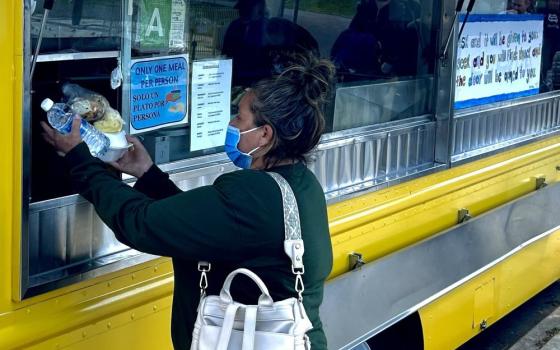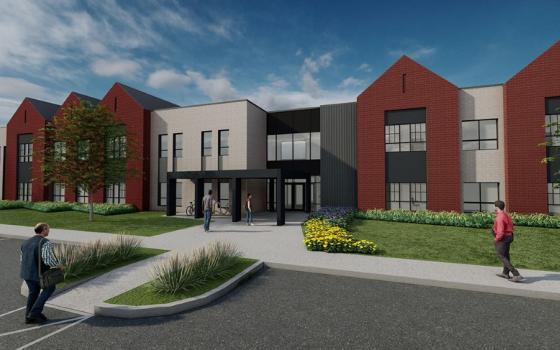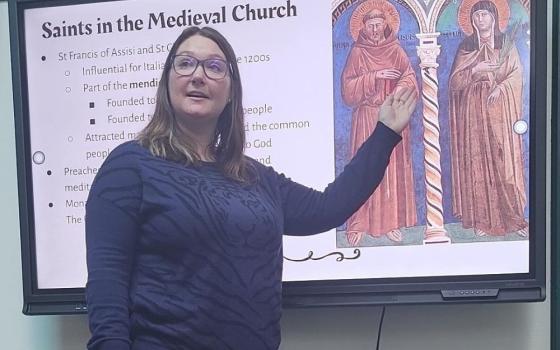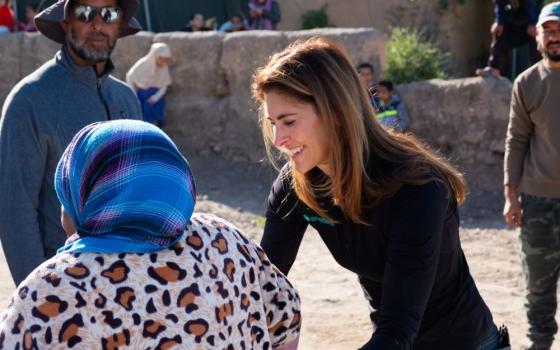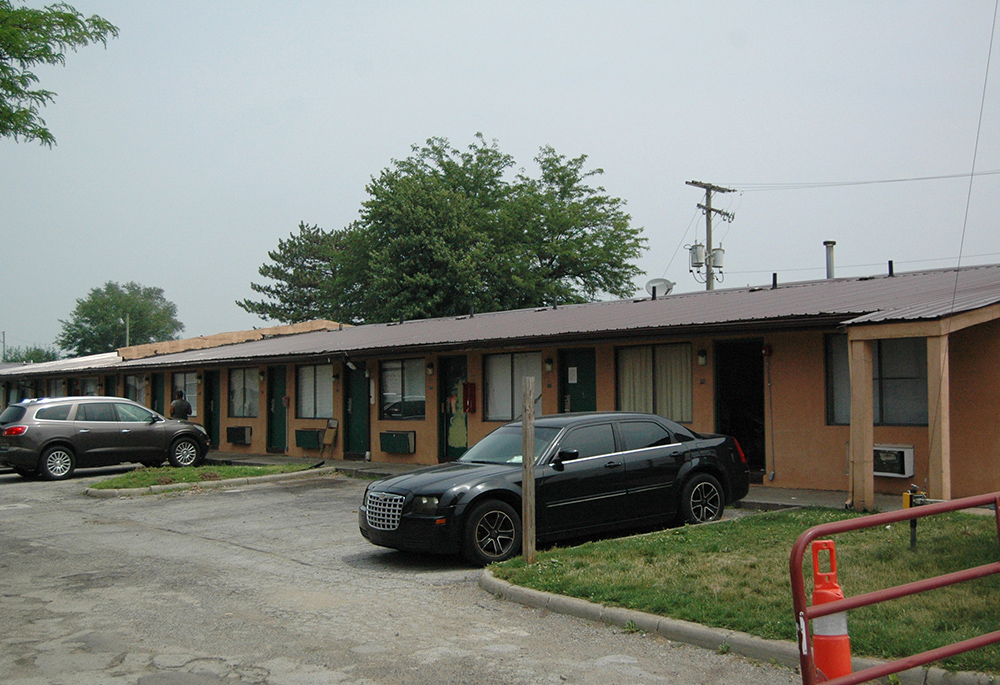
The outside of the renovated Knights Inn in South Bend, Indiana, that now houses the Motels4Now project to offer immediate housing to persons experiencing homelessness (Bill Odell)
"Where's your home? Where do you live?"
If asked in South Bend, Indiana, at least 115 people who were recently homeless would point to an unimpressive-looking single-story beige building called Motels4Now. The building is located on the bus line on the city's west side, is within walking distance of a library branch, and is surrounded by fast food restaurants — McDonald's, Taco Bell, and Domino's Pizza.
In the summer of 2023, roughly 580,000 Americans would have to admit that they don't have any home and are homeless, based on 2022 data. According to statistics from the National Alliance to End Homelessness, the number of homeless people has been rising since 2017. Nationwide, the homeless population in the U.S typically includes many veterans, unaccompanied youth under the age of 25, and chronically homeless people with disabilities.
Until three years ago, Motels4Now was a Knights Inn Motel but was largely vacant and rundown. But, in 2020, it was renovated with CARES Act funds given through Indiana's St. Joseph County. The money went to a coalition of people concerned about homelessness in the South Bend area who had a totally new plan and purpose for that motel.
When the pandemic began in 2020, many South Bend facilities serving the homeless had been forced to close. Like other U.S. cities, South Bend saw tent cities popping up without proper sanitation or access to clean water. When some tent city residents developed Covid-19, public health officials housed them in an empty Motel 6 on State Highway 933. These Covid patients needed rest and a safe space for quarantine.
The idea of housing homeless people in motels was suddenly a viable one in South Bend and — not surprisingly — in other cities. With travel and tourism shut down, motels were largely empty all over the country.
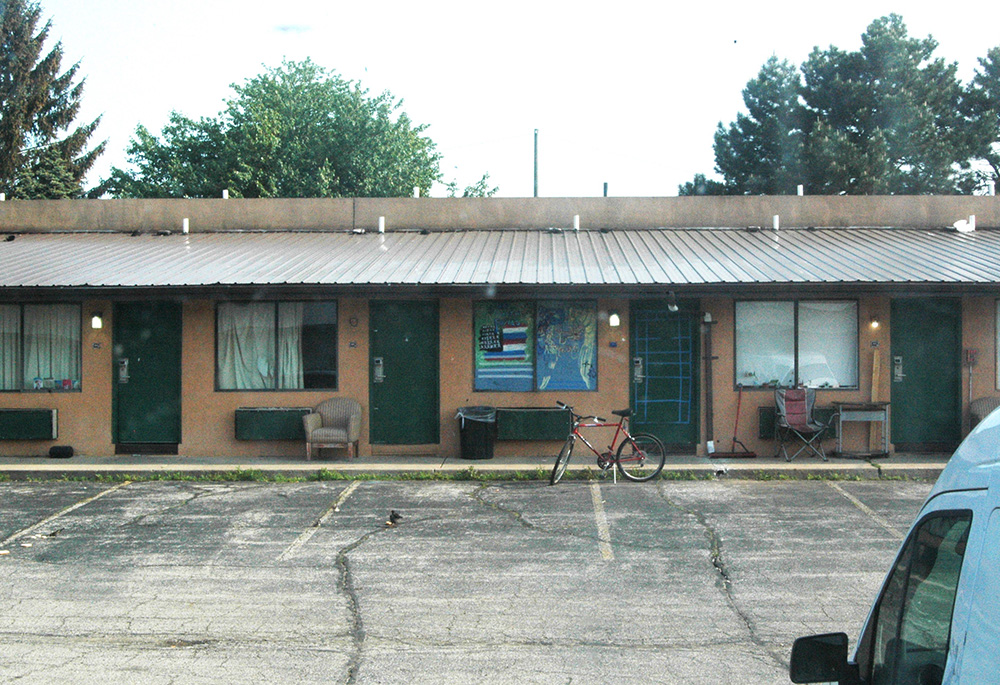
The outside of the renovated Knights Inn in South Bend, Indiana, that now houses the Motels4Now project to offer immediate housing to persons experiencing homelessness (Bill Odell)
Long before the pandemic, South Bend had programs reaching out to support the homeless. The Center for the Homeless, Hope Rescue Mission and a variety of church groups had been working with or housing the homeless for decades. But, the approach to homelessness for Motels4Now was going to be — and is — different.
Motels4Now represents the "low barrier" or "housing first" approach to homelessness. National experts on homelessness maintain that it is ultimately more effective to provide housing first for homeless people. The other issues that homeless people typically deal with — addictions, mental or physical disabilities or illness — can be more successfully addressed later, after they are securely housed.
"It's only from a place of stability that you can work on other issues," Sheila McCarthy, the director of Motels4Now since it opened three years ago, told NCR.
McCarthy is also a former member of the local Catholic Worker community which opened Our Lady of the Road, a drop-in facility for the city's homeless back in 2006. For years, local homeless folks were welcomed for hot breakfasts in the dining room on the weekends. Or, they came to use Our Lady of the Road's washers and dryers to do laundry for free. But, Our Lady of the Road didn't have space to offer housing for the homeless.

Sheila McCarthy, director of Motels4Now and a member of the local Catholic Worker community in South Bend, Indiana (Bill Odell)
"We've had 615 guests here over three years," said McCarthy about Motels4Now. She said some of those who made their temporary home at Motels4Now are now living elsewhere — with a secure roof over their heads.
"We've housed a lot of these people with Section 8 vouchers, and 140 have been housed permanently," said McCarthy. "Some former residents at the motel are now moving on to better options of their own, and getting their own places." It's a myth, she said, to suggest that people are homeless by choice. Like everyone else, they long to have a door that they can lock, a safe place to put things, and a secure place to sleep.
Motels4Now offers guests a safe and secure shelter while its staff and local community medical, mental health and legal services try to guide them to more stable living situations and help them deal with addictions or illnesses. An average stay at Motels4Now in South Bend is about four months. But, the waiting list to get a Motels4Now room — that important but temporary home — never has less than 50 names on it, and it takes months for names to get to the top.
McCarthy, who earned a doctorate in theology at the nearby University of Notre Dame and previously taught at a state-run men's correctional facility in Westville, Indiana, conceded that her present role as Motels4Now's director is pretty challenging — every day. "Just about everyone we work with has a physical or mental disability," she said. Some have dealt with — or are still grappling with — long-term addictions to drugs or alcohol.
Solar-powered security cameras now constantly monitor activity in and around the three buildings that constitute the motel complex. An around-the-clock support staff and security team help McCarthy oversee activity in and around Motels4Now.
Margaret ("Margie") Pfeil, Motels4Now's board president, is a theology professor at Notre Dame, and a member of the Catholic Worker community. She said that there are deeper reasons — social justice reasons — to find homes for the homeless. These reasons are embedded, she said, in Catholic social teaching and in the Gospel.
In Matthew 25, she said, Jesus challenges his followers to embrace the works of mercy. Community-wide efforts to house and care for the homeless, she said, are another expression of caring for the body of Christ.
Advertisement
Pfeil said it cannot become "normalized" that people are forced to sleep outside in harsh conditions.
"I think we're being invited now by the Holy Spirit to live into a different way of being together, one that really prioritizes the lives and dignity of the most vulnerable people," she said. "I think one of the temptations of super abundance is that people begin to believe that they've earned what they have and that there's no reason to share it. … That's just not true and it's not what God desires."
Inevitably, Motels4Now, has had and continues to have its detractors.
McCarthy and other staff members work hard to stay in touch with people living in houses near the motel. Some business owners near the motel have complained about beer cans and trash littering their parking lots.
Additionally, the St. Joseph County Council recently blocked funding for Motels4Now, with several council members suggesting that people should be able to pull themselves up by their bootstraps.
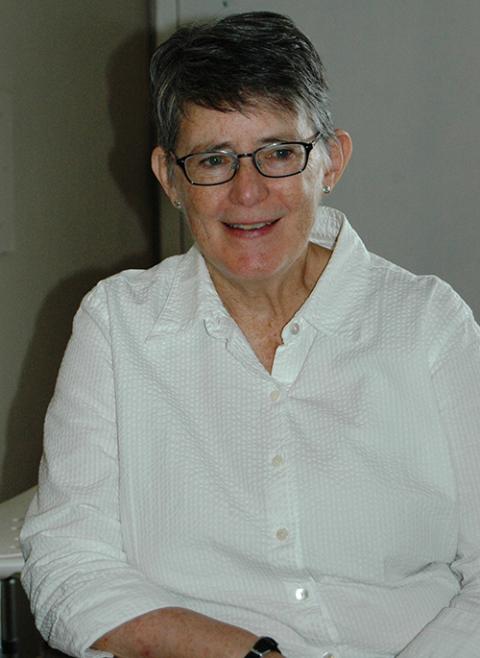
Margaret ("Margie") Pfeil, Motels4Now's board president and a theology professor at the University of Notre Dame (Bill Odell)
Nonetheless, Pfeil believes that many political and church leaders in the South Bend area are embracing the challenges of housing and caring for the homeless. The city has pledged $4 million to help build the New Day Intake Center which will replace Motels4Now in several years. Local churches have also contributed funds and volunteers to help gather furniture for someone's apartment or to help clean the parking lot and join residents for a meal.
One local Protestant church runs a weekly Bible study program for interested residents. Early in April, Bishop Kevin Rhoades, of the Fort Wayne-South Bend Catholic Diocese, led a prayer service to bless Motels4Now, its staff and residents.
McCarthy and Pfeil pointed also to national groups working on homelessness, such as Community Solutions, a nonprofit based in New York City. In 2021, Community Solutions was awarded a $100 million MacArthur Foundation grant to help end homelessness in 75 American cities within five years.
Lauren Barnes, the group's media strategist, said one goal is to address the country's acute shortage of affordable housing. Much of it is due to the gentrification of housing in many cities, including South Bend. Some of Community Solutions' success stories — in places such as Santa Fe, Brooklyn, New Orleans, Washington, D.C., and Aurora, Colorado — center on providing immediate safe housing for those in need.
Every homeless person also has a story, Pfeil pointed out, though the story can sometimes be heartbreaking. Many homeless people can be helped and can live healthier, safer, more stable lives. But, she said, there will always be some with special challenges and sad stories.
Pfeil mentioned an older woman named Madeline. Motels4Now has tried to offer help, but Madeline is unable to commit to staying in one place.
"It's gut-wrenching to see her on the street pushing a walker with all her things in it," said Pfeil. "She's well-known everywhere. She's a person we need to wrap our arms around but it's hard to do when she leaves so often."
[This article was made possible by a grant from the Hilton Foundation.]





